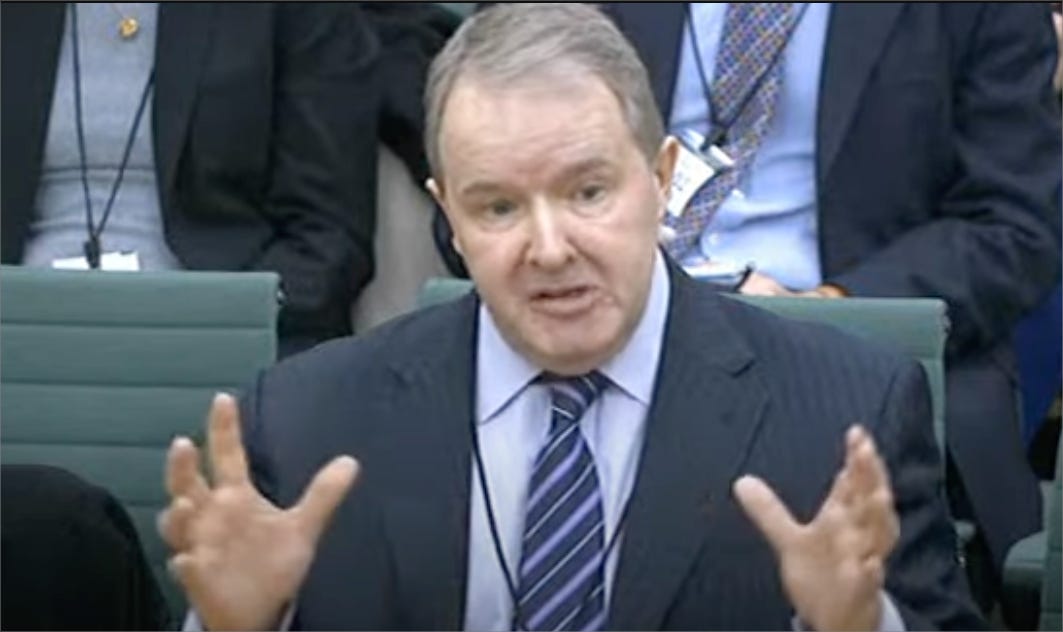Destroying the brand in order to save it
The UK's Post Office scandal throws up one more lesson for how to understand journalists

Companies spend a lot of time talking about their brand(s). But to most journalists the word is meaningless. The word both groups are really thinking about is reputation, as that captures its true importance, since it's the hardest asset to build up and the easiest to lose. Think of it that way and you'll understand better about how seriously to take any inquiry from a journalist exploring potential wrongdoing in your organisation.
Once again I'm turning to the British Post Office saga for material to demonstrate this. The case, as readers will know, is about the wrongful persecution and prosecution of those running the company's post offices, accusing them of theft and fraud when its Fujitsu computer system showed accounting shortfalls.
Yes, the story already feels a little as if it's now in the rear view mirror. But it so painfully highlights what can go wrong when a company misunderstands what 'brand' is, it deserves another airing. And it is still laying waste, with terrible consequences for the lives and reputations of nearly everyone involved, from the legions of lowly sub-postmasters who went to their graves unabsolved, to the apparatchiks and executives who must now take their turn to feel humiliated and ashamed.
For 20 years the Post Office prioritised the preservation of its 'brand', believing that without it the company would lose its most valuable customers, two government agencies that provided much of its income (the Department for Work and Pensions and the Driving and Vehicle Licensing Agency.)
But, fatally, it viewed the sub-postmasters as the threat, not a new computer system.
The cottage industry
The flawed logic is easy to see in testimony given back in 2015, when the problem was already 15 years old, but still far from tipping in favour of the beleaguered sub-postmasters. The General Secretary of the National Federation of SubPostmasters, George Thomson, was asked by a House of Commons committee whether sub-postmasters were still experiencing problems with the Fujitsu IT system at the heart of the matter.
"We do £350 million a week," he told the committee. "We pay out £18 billion a year for the DWP in Government benefits. The DWP would not have re-awarded the Post Office card account contract, which pays out £18 billion a year, in the last month if they thought for a minute that this computer system was not reliable."
On that he was right. But ensuring that was the case, he told the committee, was not about checking whether the computer system itself was reliable, but in suppressing the voices of those who said it wasn't. "We have to be careful," he said, "that we are not creating a cottage industry that damages the brand and makes clients like the DWP and the DVLA think twice."
Senior Post Office executives were more polished in their description of the situation. But the bottom line was always the same: We need to preserve the brand, whatever it costs, even as it became increasingly obvious that the brand bore little relationship with the underlying reality.
It's important to remember this wasn't gradual. From the outset the Post Office chose to believe the system was not at fault, the sub-postmasters were. In one early adopter Post Office, the Horizon system was installed in January 2000. By July it had a shortfall of £30,000, and auditors closed the Post Office. The sub-postmaster was later convicted of false accounting. (Source)
The branding iron
For this approach to work, it needed its own internal logic. The computer system could not have problems if every sub-postmaster reporting shortfalls was a likely criminal. You had to have one, not the other. Rob Wilson, then head of criminal law at the Post Office, wrote in an email in 2010: "To continue prosecuting alleged offenders knowing that there is an ongoing investigation to determine the veracity of Horizon could also be detrimental to the reputation of my team."
His team's reputation could take a hit if it was using the law against sub-postmasters while another part of the Post Office was investigating whether, indeed, those same sub-postmasters may have a point when they said the IT system was faulty.
His conclusion: don't investigate Horizon. Don't look for something you don't want to find.
But if that was the case, why investigate the sub-postmasters at all? Why not write off the shortfalls, keep quiet and move on?
The answer, it turns out, is two-fold.
Firstly, money. In 2003 the Post Office was trading at a loss, putting pressure on staff to recover debts and making that part of performance-related targets. (Source) Indeed, when sub-postmasters added their own funds in desperate efforts to redress the computer-derived losses, such "unexplained windfalls" were quietly transferred to the bottom line. In the words of one sub-postmaster: "as a result... top executives are showered with bonuses and honours." (Gordon Martin, of Moor Falmouth: Source)
And then of course, there's reputation. If it's a battle between the reputation of the sub-postmaster or the Post Office, the big guns would have to come out. “Cases raised for investigations will be limited to those likely to seriously damage the brand or reputation of the Post Office," one internal Post Office document declared. Source Any legal action was not about recovering money, since that was already flowing in, but in ensuring that no sub-postmaster should challenge the sanctity of the brand. They needed to be silenced.
The ultimately fatal logic of wagon-circling ensured the Post Office was committed to ruining hundreds, thousands, of lives. "It seems that people within the Post Office did everything possible to protect the reputation of the Post Office," said Sam Stein, a lawyer working on behalf of the sub-postmasters, "and, whilst doing so, did everything possible to destroy the reputation of their own staff. The Post Office broke people. They broke good, honest, people. Some did not survive." (Source)
The witness statements submitted and interviews conducted show just what this meant, as individuals' reputations were trashed to destroy this "cottage-industry" of sub-postmasters damaging the Post Office brand.
Pauline Thomson, sub-postmaster of Matfield, Kent from 2004 to 2008, said "some (customers) would 'cut me dead'. Some people would blank me."
Tahir Mahmood, sub-postmaster at Selly Oak, Birmingham, between 1999 and 2005, and sentenced to 9 months' imprisonment, described how "the impact (was) greater to my reputation within the family than outside it. At family gatherings, I could hear people gossiping about me or staring at me."
Mary Philp said she still takes a detour to avoid the village in Fife, Scotland, where she was sub-postmaster, (Source) "because I still feel the effects of the humiliation of wrongful accusation and the unjustified judgement of the community there."
The whipping stick
On the surface this seems absurd. To protect "the brand" the company attacks the only Post Office people the public see, so for them they are the brand. So the Post Office seemed intent on destroying its own key resource -- those in the field actually providing the service. To those on the front-line it was baffling. "We’re the ones standing at the front of the counter, taking the abuse from the customers, to put money into the Post Office to make them the global brand or the big brand that they are," said Kevin Palmer, sub-postmaster in Rayleigh, Essex, from 2007 to 2016. (Source)
But it may have seemed logical. The Post Office, in effect, was shoring up its brand by exploiting and then trashing those of its own people. One anonymous witness described it thus: "We postmasters have been abused for our honesty and loyalty to the Crown and the Post Office reputation. The Post Office used this honesty and loyalty as a whipping stick." (Source)
But so long as the Post Office's reputation held fast, it was a winning strategy. And the sad reality was -- and possibly still is, if some conversations I've had -- that in a battle of brands between the Post Office and local pillars of the community, the former would win out. "I can remember friends and acquaintances had a difficult time believing that I was completely innocent and thought that a respected institution such as the Post Office must have had some reason to suspect me," Jean Smith, manager of East Boldon Post Office, Tyne and Wear, told the Post Office Inquiry. Source
Reputations crumbled to dust.
"I was totally devastated. My job, business and reputation destroyed in one day," said Nicola Arch. (Source) "I literally lost everything overnight. Money and property and business is one thing, but losing your reputation and dignity is another," said Robert Ambrose, sub-postmaster in High Wych, Hertfordshire, 2010-2012. "My reputation and the reputation of my family is more important that money to me. I want my reputation back," said Heather Earley, sub-postmaster at Newtownabbey, County Antrim 2011 to 2017. (Source)
The burden they were carrying was especially heavy, because in many cases the Post Offices they ran were closed down, leading the local community to see the sub-postmasters as responsible for losing a precious local resource. "For many years, I have always felt that there was a stain on my reputation as suspicion fell on me when Post Office Limited closed the office after I left and moved it to a large convenience store. The community saw this as a betrayal as the post office had been the centre of the village for decades," said John Bowan, sub-postmaster at Pontyclun, Wales, from 1998 to 2004. (Source)
The strategy is, in hindsight, absurd. It has helped decimated the Post Office's network of post offices. In 2000 there were 18,000. In 2022 there were 11,635. The perverse logic required to protect a position essentially led to the point where to challenge that thinking would have meant ripping up the company and starting again. But while it may seem absurd now, it's clear that no senior Post Office executive considered it so, for nigh on two decades.
The culture may have come from the top, but as it seeped through the company no one could ask the fundamental question: are we backing the wrong horse here? Is the computer itself at fault, and if so, does that mean everything we've done has to be unravelled? No-one internally, or appointed externally, could afford to ask that question -- until, eventually, the public woke up to the biggest miscarriage of justice in British history.
In short, the logic could not unravel itself -- it required a hefty push from outside.
And to me that's the worry.
The wagons
The logic, I fear, is embedded in much brand or reputation management. I don't claim to be an expert on such subjects from within PR, but I do know what it looks like from a journalist's point of view. I have experienced some of the flawed logic at play when, as a journalist, I've approached a company with a story that sets off alarms about brand and reputation.
If a journalist finds something apparently wrong in an organisation, and asks for an interview, the usual reaction from that organisation is to try to discourage the journalist from writing about it -- either by denying the story, presenting evidence that apparently contradicts the story, or by challenging the journalist's understanding of the story.
When I interviewed the CEO and his team at a major chemical manufacturer about a quirk in their company structure that suggested there had been an illegal pay-off, a flunky left the room and ten minutes came back with a document that he said provided an innocent explanation for the incident. The single page of A4 had no letterhead, no date and no signature, and was warm enough to suggest it just been typed or printed. I'm not sure how they thought I might react but it definitely wasn't the way that I did.
On another occasion I interviewed the senior executive of a global telecoms equipment manufacturer and challenged the company's line on allegations it had stolen firmware code from a rival. The PR head later sent me what he said was proof that the code was originally developed by the company. It took me about five minutes to discover that there was an earlier version of the code, provably written by the rival. To his credit, the PR person didn't debate the point.
I get it. It's perhaps understandable that the first reaction to a possible negative story would be to circle the wagons and head the journalist off at the pass (at the risk of murdering the metaphor.) I am the first to admit sometimes this works: sometimes there just is no way to confirm a story and it ends up languishing.
But this never ends well. A journalist will always pull at the string eventually. In the case of the Post Office its internal logic may have been a useful holding pattern had it gone back to check the allegations more thoroughly -- and address them. But it didn't. It continued to harass sub-postmasters and closed its eyes to the obvious logic that computers must be at least partly to blame for all these shortfalls reported by unblemished sub-postmasters.
The problem is that this circle-the-wagons approach puts down roots and becomes a fortress. Defending it becomes part of the raison d'être of the organisation. A judge described it thus: “A theme contained within some of the internal documents is an extreme sensitivity (seeming to verge, on occasion, to institutional paranoia) concerning any information that may throw doubt on the reputation of Horizon, or expose it to further scrutiny.” (Source)
Staff could see no one would be fired for this behaviour so it became institutionalised, even up to 2022, when Chris Trousdale, sub-postmaster at Lealholm Post Office, Yorkshire, told the inquiry: "They let us suffer for longer – even now, you can read the Post Office dribble that they put out and you think: you’ve got no contrition, you’ve got no remorse, you’re just in brand protection 101 mode, that’s all you’re interested in." (Source)
It was clear that none of this was accidental. John Breeden, a Post Office employee, was asked by the inquiry about where this culture of protecting the brand image at all costs came from. "In my view, it came from the top." (John Breeden was an employee of the Post Office)
With the executives still toeing the same party line, the rank and file were empowered to persecute sub-postmasters, especially those that refused to bow down. Suzanne Palmer, sub-postmistress in Rayleigh, Essex from 2004 to 2005, recounted how she was still hounded even after she was found not guilty in court. The Post Office refused to reinstate her, losing her her home, her business and her credibility. "The Post Office tried to do all they could to ruin my reputation, even to the extent of saying that if my manager gave evidence on my behalf they would prosecute her as well," she said. (Source)
The furnace and the wrench
The Post Office, in short, became the prison of its own 'reputation management.' Which to me demonstrates how flawed any strategy is that doesn't first address the underlying truth of an allegation that threatens an institution's brand.
In the case of the Post Office, its reputation lay in how well it could deliver the services of its clients -- the mail, pensions, driving licences etc etc. That meant, and still means, that the company is essentially in the business of maintaining two pipes. The first pipe is the one between itself and its sub-postmasters channeling services. The other pipe is between its sub-postmasters and the customers of those services. The success of one depends on the success of the other. If Mrs Birchsquirble of Llanybydder can't get her pension then the system has broken. Ultimately the reputation of the Post Office -- its brand -- depend on whether that service can be provided.
The Post Office, like many a company I've either written about as a journalist, or worked with on the other side of the fence, confuses brand and reputation and sees both as something that is 'managed', an amorphous mass that can be separated from the institution itself, massaged and spruced up, given a dash of paint, a new logo, renamed if necessary, helped along by crisp mission statements, press releases, friendly or sponsored coverage, and by avoiding pesky journalists asking difficult questions.
I would argue the opposite is true. Reputation is forged in the furnace of real-world events, where institutions and their leaders tackle, and are seen to tackle, challenges where they exist. I admit that we journalists failed to notice this story until it was way too late, but even then, some soul-searching and tough questions from senior management might have led to the brave but necessary investigation, which would have saved countless millions, hundreds of prosecutions, and quite a few lives. It's never too late to use a journalist's questions as a wrench to force open some cupboards.
Forget managing reputation in circumstances like these. I wrote a few weeks ago about a company trying to deliver water to Jakartans after state utilities were privatised. That story caused significant upheaval and not a few departures. But the story wasn't wrong, nor was it misleading. The problems were there for anyone to see. Yes, perhaps another journalist might have put a more positive spin on it, but the problem wasn't a PR problem. It was the result of an internal failure to recognise the scale of the problem the company faced, and deal with it before inviting a journalist in to view the wreckage. If I hadn't written about it, the story would have come out anyway.
Reputation is not a shiny new façade or cladding on a crumbling edifice. Reputation is built and maintained by doing things right. It's like that saying about when to plant a tree. Even when it seems it might be too late, it's still better than later. Later, and your reputation will be the worse for it, even if you're all vested up and on your desert island in the sun.
It took a judge to see what the Post Office had become by burying its head in the sand. Speaking back in 2004, Judge McFarland took a swipe at the company's disastrous and eventually reversed rebranding as Consignia a couple of years earlier, and saw its effort to prosecute a sub-postmaster for what it was. He told the court: "The Post Office case was just as much of a sham as its rebranded new image of the nation's most trusted brand." (Source)
It was true, but it would take nearly another 20 years for that to become widely known.
Un-circling the wagons
So what are the takeaways? My argument is that the Post Office, as a case study, is different only in the extremes -- the lengths the company went to protect its brand, the length of time it took for the truth to be widely acknowledged, the number of people wrongly persecuted and prosecuted, the sheer size of the scandal and its impact.
Beneath the surface there are lessons we can all learn.
It's important to understand why this story became so big and dragged in public figures and governments. It was because journalists wrote about it. Not as many as there should have been, and not as soon as we should, but that was a function of the distributed nature of the crime. None of the victims knew -- for years, in some cases for the rest of their lives -- that there were other victims as well. As I've mentioned in earlier pieces, sub-postmasters, by virtue of their job, are spread out around the country and have no formal or natural mechanism for connecting to others. (The union which was supposed to do that abandoned them.)
So we need to remember that in the majority of cases like this it's nearly always the result of journalists doing their job well. Journalists will always, eventually, find out. So it naturally points to the absolute necessity of taking journalists seriously when they come knocking at your door. It's not enough to fend them off thinking they and the story will go away. It might, for a while. But never forever.
This means that when a journalist makes this approach, with allegations of illegality or other transgressions, the case needs to be assigned to someone of sufficient seniority to handle, and if necessary to investigate. Is there some truth in what the journalist is reporting? In the case of the Post Office, it's clear that there's an institutional knowledge about the problem, but that prejudice and self-preservation have created a bunker mentality, where the truth is intentionally shut out (by seeking only confirmatory noises from those who know about the computer system that it's not to blame) and the victims themselves, the sub-postmasters, treated as criminals.
So it goes without saying -- although it appears it needs to be said -- that ignoring a journalist who approaches with a story will ultimately be fatal. After acknowledging the journalist's request and learning what you can about what their angle is, the question to ask, then, is: is there something that I don't know that the journalist does? Are my own staff keeping information from me? More often the reaction is both to push away the problem and root out the leak within the organisation. Both of these are likely to be counterproductive, but are often in the interests of several layers within the organisation -- mostly those who would not ultimately carry responsibility if the allegations ended up being true.
The Post Office showed us that the company confused brand for reputation. If the brand could be protected, the company's reputation would remain intact. But that's not how it works. Brand is what you deliberately create in order to distinguish your company, or product, or service, from others. Reputation is what you gain through your actions, your responses, your statements, your finances.
Reputation is what you have left after you've done everything you feel is necessary to do. It's not something to be 'managed'. It's an ongoing measure. And yes, the truism is just that: it's the hardest thing to earn and the easiest thing to lose.
I don't know how the Post Office should have handled the case. But I do know that its really fundamental error, the one that marked the point of no return, was when the company started harassing and threatening journalists. Instead of seeing this as an opportunity, a chance to un-circle the wagons and see if the allegations were true, they took the other route. After that the issue was not whether, but when, the truth would come out, and there would be no reputation left to manage.






